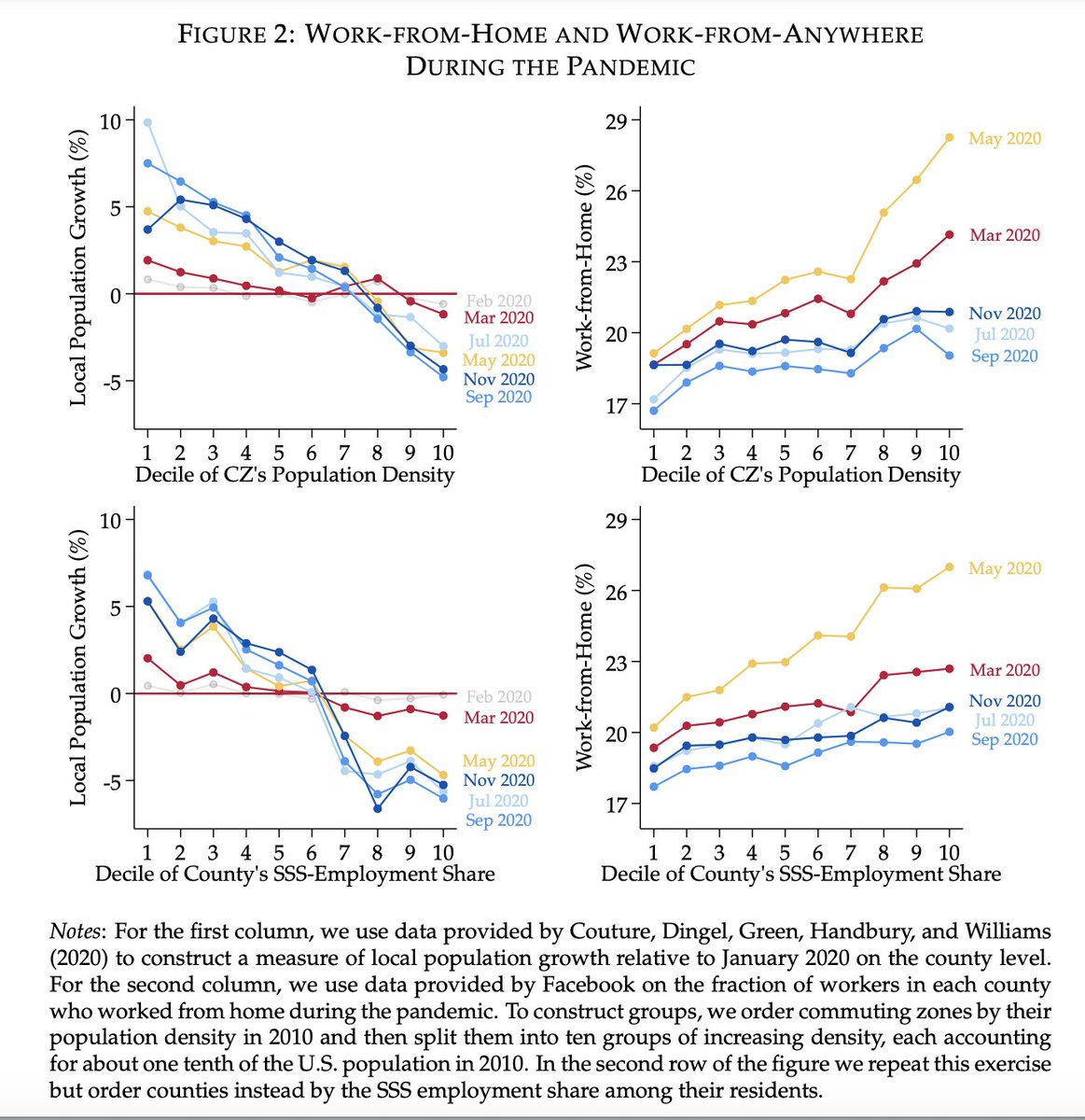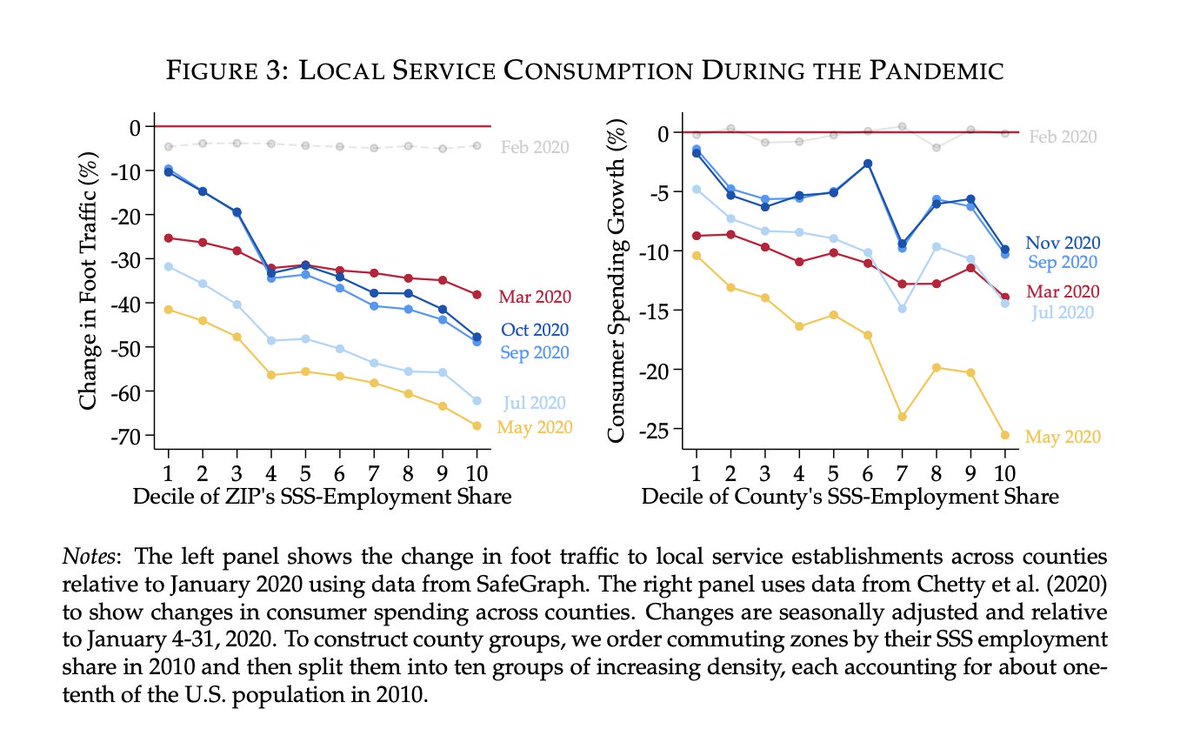Opening 2021 with an attempt to answer some of the very interesting questions posed by @alamgael: How will the pandemic affect gentrification? What will be its effect on within-city inequality?
I'd probably need pages but let's try with some tweets. Thread https://twitter.com/alamgael/status/1344714683140485121
https://twitter.com/alamgael/status/1344714683140485121
I'd probably need pages but let's try with some tweets. Thread
 https://twitter.com/alamgael/status/1344714683140485121
https://twitter.com/alamgael/status/1344714683140485121
Much has been discussed on the effect of the pandemic on cities. @ProfDiegoPuga and @newyorkonomics suggest that cities may not be as impacted in the long-run. Remote work will push people away but cities are also key for the consumption of non-tradeables (e.g. restaurants). 2/n
Moreover, a recent paper by @MiyauchiYuhei, Kentaro Nakajima & @ReddingEcon shows that consumption access is similarly important as workplace access. 3/n
Which effect will dominate in the long-run? We don't know yet but we can look at several things: migration patterns, costs of living, changes in local amenities such as local consumption businesses... 4/n
We know several things:
1. @josh_coven and @arpitrage document an urban flight at early stages of the pandemic
2. @parkhomenko_a_v, @mattd_econ, and @eunjeeecon predict that remote work will empty our city centers with workers moving to the suburbs 5/n
1. @josh_coven and @arpitrage document an urban flight at early stages of the pandemic
2. @parkhomenko_a_v, @mattd_econ, and @eunjeeecon predict that remote work will empty our city centers with workers moving to the suburbs 5/n
3. @juhreka13, @mara_squi & Nico Voigtlander show that more organization is needed to make remote work sustainable.
4. @fpeckert, @sharatganapati & @Conor_A_Walsh show working from home reached its peak in May 2020 and is slowly reversing but cities keep losing population 6/n
4. @fpeckert, @sharatganapati & @Conor_A_Walsh show working from home reached its peak in May 2020 and is slowly reversing but cities keep losing population 6/n
However, on the other side of the story, they also document that consumer spending is declining and more so in denser areas.
This decline can come from 2 channels: a drop in income due to job losses or the impossibility to consume locally due to restrictions. 7/n
This decline can come from 2 channels: a drop in income due to job losses or the impossibility to consume locally due to restrictions. 7/n
4. Perhaps surprisingly, Chetty, @John_N_Friedman, @nhendren82 & @michaelstepner find that in-person services are mostly responsible for such drop, suggesting people adapted their consumption patterns during the pandemic, especially those at the top of the income distribution 8/n
5. Finally, I have not seen work looking at rents (if you know any, please let me know!) but from anecdotal evidence, rents are dropping by 10-15% in NYC. 9/n
So to answer the original question of what will happen with gentrification and within-city inequality in a COVID era, we need to put all of those factors together. 10/n
In the short run, it looks like the pandemic is "de-gentrifying" neighborhoods with high-skilled workers fleeing cities and rents going down. 11/n
In principle, a drop in rents is especially good for low-income residents (more likely to be renters + non-homothetic consumption of housing).
However, and simultaneously, they are losing their jobs at disproportionate rates and may be forced to also leave urban areas 12/n.
However, and simultaneously, they are losing their jobs at disproportionate rates and may be forced to also leave urban areas 12/n.
One question is how long this short-run effect will last, which clearly depends on how fast we can return to "normality". 13/n
Evidence points that, after the return to "normality", this trend is likely to reverse back due to willingness to consume locally + not clear remote work is here to stay, concluding that the pandemic alone may have small long-run effects on gentrification. 14/n
However, the pandemic may fuel other pre-covid era trends, such as the recent population drop in urban areas due to increasing costs of living. 15/n
Goes without saying that I really don't know which force will dominate and we need a more rigorous prediction. We need to understand the trade-offs between the effects of remote work in a world where workers care about living costs and the consumption of local goods. 16/n
Any questions, suggestions, critiques, and further discussion are always welcome.
And happy new year everyone!
FIN/n.
And happy new year everyone!
FIN/n.

 Read on Twitter
Read on Twitter




